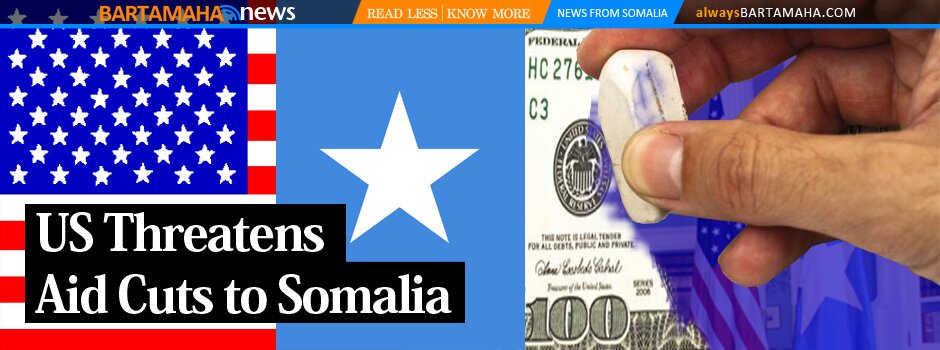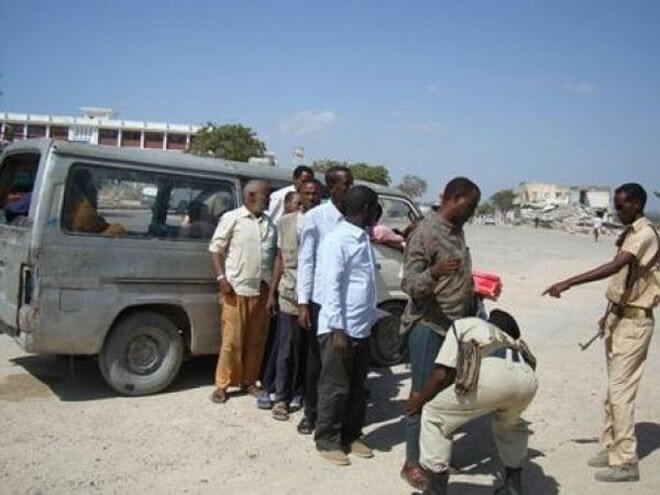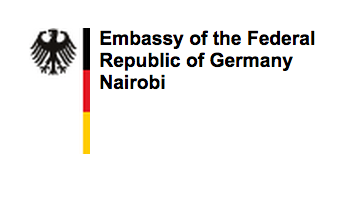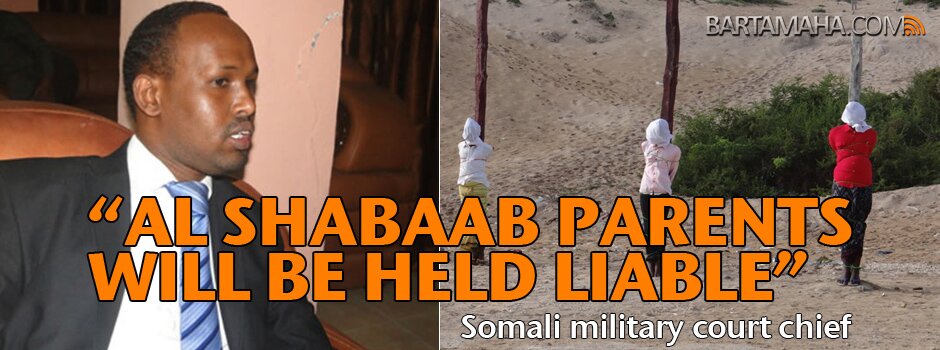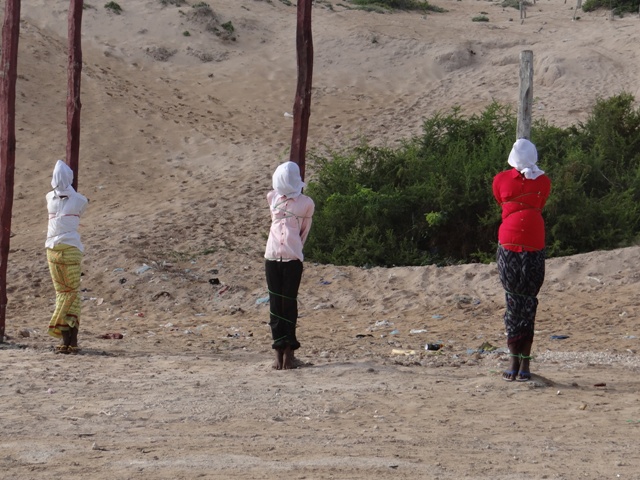Somali military court chief wages legal war against al-Shabaab, defends executions
Mogadishu — In the two months since Colonel Abdirahman Mohamed Turyare took over as chief of Somalia’s military court, the court has handed down the death penalty to convicted al-Shabaab members, carrying out nine executions so far.
Turyare points to the court’s executions as proof that justice is being served and that the court is making strides in the fight against terrorism.
However, it has recently faced sharp criticism over the way it has handed down decisions, withsome critics saying the court has executed people without a transparent judicial system and others accusing it of taking on civilian cases that have nothing to do with military matters.
In an exclusive interview with Sabahi, Turyare spoke about the rulings the court has carried out, the accusations it has faced and its achievements in general.
Sabahi: What can you tell us about the court’s rulings?
Colonel Abdirahman Mohamed Turyare: We have carried out nine executions so far and there have been about ten other prison sentences [handed down], ranging between 10 and 30 years. There are also some other people who are awaiting sentencing and some are serving life terms.
The people we have executed so far are people who have admitted to their crimes and are part of al-Shabaab, which is an illegal organisation. This enemy is a new enemy that is being fought in a new way. They have waged an unethical war against us, and we will wage a bold legal war against them in order to defend citizens.
Our objective is not to kill, but to remove the youth from al-Shabaab.
Sabahi: The court leadership that preceded you did not carry out any executions, so what is the reason for expediting executions of al-Shabaab members now?
Turyare: We have decided to wage a new [type of] war against terrorists, and this will be a joint effort between the security forces and the military court. Our role is to firmly impose treason laws against the terrorists who cause problems but expect to continue to live [without consequences].
Al-Shabaab operatives tell the young people they send out that they will return safely, and we are sending the message that the ones who are sent will not return safely and will face the [legal] punishment they deserve. The result [we expect] from that is for al-Shabaab to no longer find young people to use.
Secondly, we want to remove public fear stemming from al-Shabaab’s propaganda. [Al-Shabaab] tells people that they cannot collaborate with the government and [report] al-Shabaab fighters because if one is arrested he will be released back and will kill those [who reported] him. Therefore, we want to show our people that the captured al-Shabaab operatives will not be released until they face the punishment they deserve. [We want] to relieve the people’s fear and restore their confidence so that they can rise up and fight against those [al-Shabaab operatives] who are hiding [within their communities].
The third point is about the collaboration between the government and the people. We have ordered that every al-Shabaab member who is captured to be arrested along with the relatives he lives with. The families have to be aware of the activities of their children. In each family that responsibility lies with the head of household. They have to report the person they know has joined al-Shabaab. They also have to report the person whom they are suspicious of. That is a national duty that the government and the public can work on together.
Sabahi: But some al-Shabaab members operate unbeknownst to parents, is arresting them justified?
Turyare: The security agencies will first ask them questions. When it is clear that at the very minimum they knew something about [their activity], or if the [arrested al-Shabaab members] are underage, they will be arrested and sent to the court.
If they become suspicious of their children, parents are required to report them to the relevant agencies. Parents must also report [their children] if they cannot locate them or if they have joined al-Shabaab. Otherwise they will be held partly liable.
Sabahi: Human rights organisations and some members of the public have accused the court of convicting civilians although your mandate is for the armed forces. What is your response to that?
Turyare: That is a wrong argument and it is unfair. Anyone carrying a weapon is a soldier. The difference is that there are troops with a legal basis and troops without a legal basis. Therefore, military law applies to anyone who carries a weapon, even if they were illegally formed, like the militias. The armed forces law states military law applies to anyone or any militia that takes weapons against the government…Therefore, an armed organisation cannot be called civilian.
Sabahi: How will the anti-terrorism bill currently before parliament affect your work?
Turyare: The anti-terrorism legislation will make it easier to wage a much broader war against terrorism.
The law will not only apply to those who commit the [terrorist] act, but also anyone who assists them. In addition to those who train [militants] and other members of a terrorist organisation, people in their households, those who provide them information and have ties with them, will be subject to the law. The law will also facilitate taking over the assets of the terrorists. It will help us in all of those matters.
Sabahi: There have been allegations of people not receiving a fair sentence in the military court. What can you tell us about the transparency of the justice system?
Turyare: We take several steps that prevent mistakes from happening.
First, the [police's] investigation department prepares [the case] with evidence. Then the prosecution takes over to ensure that the evidence the investigations department submitted is complete. The case is then forwarded to the first level court. The first level court hears the case and gives the accused an opportunity to get a defence lawyer, and if they cannot afford one, we provide a lawyer. At that point, if they are cleared from the crime, we release them. If they are found guilty, we sentence them. After that, they have an opportunity to appeal to the armed forces high court, which hears the case once again. We conduct judgements in this transparent manner.
Sabahi: What is the burden of proof to sentence someone to death?
Turyare: The biggest evidence is a confession. All of the individuals we executed confessed to the acts they were convicted of.
Sabahi: But some people say suspects are tortured to obtain a false confession. How do you respond to that?
Turyare: There is no truth to that. Security agencies cannot torture people. The prosecution monitors them. Also, [during sentencing] we do not consider confessions made to [the police], but those made in front of the court, and one cannot be tortured in front of the court since various people are present.
Sabahi: Are suspects’ relatives allowed to be present during court proceedings?
Turyare: Relatives can be present at some of the cases, but they cannot be present at some of the terrorism related cases, and there is a reason we do that.
Sabahi: Are Somalia’s laws and the judgements you issue in line with international law?
Turyare: We act in accordance with international law. We are in a time of war and we are defending the public. Therefore, when addressing [justice-related] issues, we want human rights organisations to consider the war situation we are in.
The enemy that blows himself up deserves to be condemned. A nascent government that is defending its citizens does not deserve condemnation. We will fight with the enemy, but we will do it legally.
Source: Sabahi
Comments
comments
 Calendar
Calendar






















